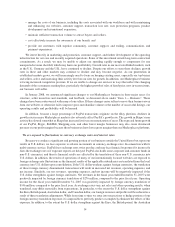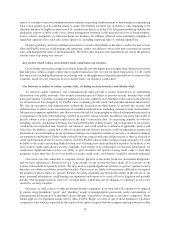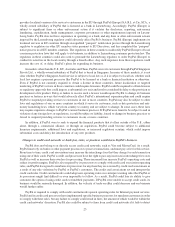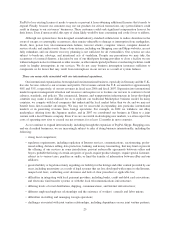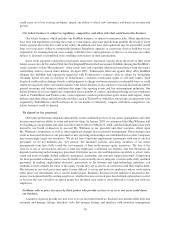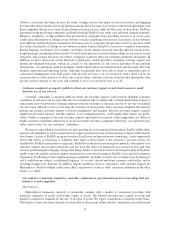eBay 2007 Annual Report Download - page 33
Download and view the complete annual report
Please find page 33 of the 2007 eBay annual report below. You can navigate through the pages in the report by either clicking on the pages listed below, or by using the keyword search tool below to find specific information within the annual report.provides localized versions of its service to customers in the EU through PayPal (Europe) S.A.R.L. et Cie, SCA., a
wholly-owned subsidiary of PayPal that is licensed as a bank in Luxembourg. Accordingly, PayPal (Europe) is
subject to significant fines or other enforcement action if it violates the disclosure, reporting, anti-money
laundering, capitalization, funds management, corporate governance or other requirements imposed on Luxem-
bourg banks. PayPal does not have experience in operating as a bank, and any fines or other enforcement actions
imposed by the Luxembourg regulator could adversely affect PayPal’s business. PayPal (Europe) implements its
localized services in EU countries through an expedited “passport” notification process through the Luxembourg
regulator to regulators in other EU member states pursuant to EU Directives, and has completed the “passport”
notice process in all EU member countries. The regulators in these countries could notify PayPal (Europe) of local
consumer protection laws that will apply to its business, in addition to Luxembourg consumer protection law. The
regulators in these countries could also seek to persuade the Luxembourg regulator to order PayPal (Europe) to
conduct its activities in the local country through a branch office. Any such responses from these regulators could
increase the cost of, or delay, PayPal’s plans for expanding its business.
In markets other than the U.S., EU, Australia and China, PayPal serves its customers through PayPal Singapore
Private Ltd., a wholly-owned subsidiary of PayPal that is based in Singapore. In many of these markets, it is not
clear whether PayPal’s Singapore-based service is subject to local law or, if it is subject to local law, whether such
local law requires a payment processor like PayPal to be licensed as a bank or financial institution or otherwise.
Even if PayPal is not currently required to obtain a license in those countries, future localization or targeted
marketing of PayPal’s service in those countries could require licensure. PayPal could be required to obtain licenses
or regulatory approvals that could impose a substantial cost on it and involve considerable delay to the provision or
development of its product. Delay or failure to receive such a license would require PayPal to change its business
practices or features in ways that would adversely affect PayPal’s international expansion plans and could require
PayPal to suspend providing services to customers in one or more countries. PayPal may also be subject to other
laws and regulations of one or more countries in which it serves its customers, such as data protection and anti-
money laundering laws, which vary from country to country and are subject to change. In some cases, these laws
may require expensive changes to PayPal’s current business practices. If PayPal were found to be subject to and in
violation of any foreign laws or regulations, it could be subject to liability, forced to change its business practices or
forced to suspend providing services to customers in one or more countries.
In addition, if PayPal were to seek to expand the financial products that it offers outside of the U.S., either
alone, through a commercial alliance, or through an acquisition, PayPal could become subject to additional
licensure requirements, additional laws and regulations, or increased regulatory scrutiny, which could impose
substantial costs and delay the introduction of any new products.
Changes to credit card networks or bank fees, rules, or practices could harm PayPal’s business.
PayPal does not belong to or directly access credit card networks, such as Visa and MasterCard. As a result,
PayPal must rely on banks or other payment processors to process transactions, and must pay a fee for this service.
From time to time, credit card associations may increase the interchange fees that they charge for each transaction
using one of their cards. PayPal’s credit card processors have the right to pass any increases in interchange fees on to
PayPal as well as increase their own fees for processing. These increased fees increase PayPal’s operating costs and
reduce its profit margins. PayPal is also required by its processors to comply with credit card association operating
rules, and PayPal has agreed to reimburse its processors for any fines they are assessed by credit card associations as
a result of any rule violations by PayPal or PayPal’s customers. The credit card associations set and interpret the
credit card rules. Credit card networks could adopt new operating rules or re-interpret existing rules that PayPal or
its processors might find difficult or even impossible to follow. As a result, PayPal could lose its ability to give
customers the option of using credit cards to fund their payments. If PayPal were unable to accept credit cards, its
business would be seriously damaged. In addition, the velocity of trade on eBay could decrease and our business
would further suffer.
PayPal is required to comply with credit card networks special operating rules for Internet payment services.
PayPal and its credit card processors have implemented specific business processes for merchant customers in order
to comply with these rules, but any failure to comply could result in fines, the amount of which would be within the
credit card networks’ discretion. PayPal also could be subject to fines from credit card networks if it fails to detect
23



